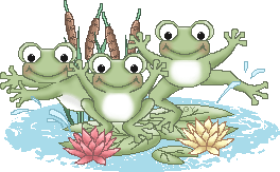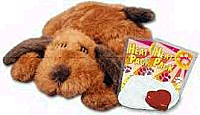
Hypoglycemia Concerns
Hypoglycemia (low blood sugar) is a potentially life-threatening
problem of puppies and toy breeds. The most common type occurs
in puppies younger than 4 months
of age.
Puppies typically develop hypoglycemia after exercising vigorously,
when they're stressed (such as during a trip to
the veterinarian)
or when they haven't eaten for awhile. The early symptoms of
hypoglycemia - trembling, listlessness, incoordination, and a dazed
or confused demeanor - occurs when the brain is deprived of glucose,
its sole energy
supply. If untreated, hypoglycemia can lead to seizures,
collapse, loss of consciousness and even death. If your puppy
develops symptoms of hypoglycemia, start treatment immediately.
Wrap your little buddy in a towel or blanket to keep her or
him warm
(shivering makes the hypoglycemia worse). If your puppy is conscious,
slowly dribble a little light corn syrup or honey into her or his mouth
or give her or him a dollop of high-calorie dietary supplement paste
(available from your veterinarian). Repeat after 10 minutes, if necessary.
Feed your puppy as soon as she or he is alert enough to eat. If your
puppy loses consciousness, rub the syrup or paste on her gums and tongue,
then immediately take her or him to the veterinarian for further care.
If your puppy is susceptible to hypoglycemia, feed her or him
a
high-quality, nutritionally balanced food at least four to five
times
a day. Healthy, high-calorie snacks may help prevent hypoglycemia
between meals. If possible, avoid subjecting your puppy to stressful
situations or extended periods of vigorous activity. Most puppies
outgrow hypoglycemia by 4 months of age. Consult your veterinarian
if your puppy continues to have hypoglycemic episodes after this age.
I could just sit here and look at
you all day.
Meal Plans
If you have a busy schedule, free-choice feeding-setting out a
large quantity of food and letting your puppy choose when and how
much to eat- may sound like a perfect plan. It's simple and easy,
but a puppy who loves to eat can easily become overweight. Free-choice
feeding also makes house training difficult because there's no set eating
(and toileting)
schedule.
Feeding your puppy regularly scheduled meals will reduce the
likelihood
of overeating and simplify housetraining.To determine how much to feed,
divide the total daily amount suggested by the manufacturer by the
number of meals per day. Adjust the amount you feed as your puppy
grows (weighing your puppy every two weeks will help you keep track).
At meal-time serve the food. If your youngster doesn't finish it within
20 minutes, pick up the food and don't offer any more until the next
scheduled meal, again offer the calculated amount.
Puppies need
to eat several times a day in order to consume sufficient
nutrients. If your puppy is younger than 3 months old, feed him or her
four or five meals a day. At 3 to 5 months of age, decrease the number
of meals to three or four. At 6 months of age, most puppies can move to
an adult schedule of two meals a day. If your puppy is prone to hypoglycemia
(low blood sugar; see the "Hypoglycemia Concerns " at the beginning
of this page), your veterinarian may recommend more frequent meals.
Do NOT feed your puppy soft canned food for very long. the chewing
of hard food helps to keep teeth clean and healthy. Canned food can
also cause your puppy to become overweight.
PLEASE DO NOT feed your puppy human food! Dog food has
everything
your puppy needs for proper
nutrition.
I am relaxed !
Making The Switch
Your puppy can graduate to adult food at about 9 to 12 months of age.
That doesn't mean you just one-day switch foods; a gradual change over
will lessen the chances of any digestive upsets. On day one, feed 75%
puppy food and 25% adult food.On day two, feed 50% puppy food and
50% adult food. On day three, feed 25% puppy food and 75% adult food.
On day four, feed only the adult food. This system works well
when you
need to change your puppy's food for any reasons.
What you see is what you get !
EXERCISE
Teacups, Tiny Toys, Toy Poodles are an easy dog to exercise.
Most of the exercise they need they get while playing in the yard
or in the house.
Miniature Poodles require slightly more exercise and are a little
more active than the Toy variety. Poodle love to run though so be careful,
they can get away from you. they also love to play so be sure to provide
plenty of toys to play with so they do not mistake furniture and other
house hold items as chew toys.
Do these ears make me look fat ?
Snuggle Puppies
Snuggle Puppies are wonderful companions for a puppy. They come
with a heartbeat and warmer and are excellent for shipping or to
put in their crates at home. If your puppy is being shipped, they
can be sent to us here at Happy Paw's to go home with your puppy.
But do let us know that you have ordered one and it is on its way.
They are available at:
www.snuggleme.com
It's not easy being this cute.
















